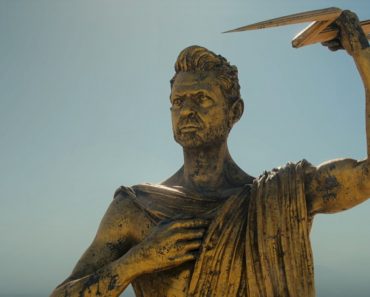For the first time ever, the beloved Greek folklore character Karagiozis springs to life in full animation. On Sunday, September 15, at 3 PM, the Hellenic Film Society will present Greece’s first full-length animated feature, Karagiozis: The Movie, at the Museum of the Moving Image in Astoria, NY. This family-friendly screening brings together generations of viewers to celebrate the centuries-old tradition of Karagiozis in a whole new, vibrant way.
The screening is part of the Society’s Always on Sunday Greek Film Series and promises to be a visual treat, combining vivid animation with humour that both kids and adults will love. Directed by Akis Karras, Christos Leivaditis, and Ekaterini Papageorgiou, this 74-minute film will be shown in Greek with English subtitles, making it accessible for all.
The story follows Karagiozis as he becomes a public secretary in a small village, though his enthusiasm far outweighs his qualifications. The light-hearted plot is filled with humour, and its message—how a positive attitude helps overcome challenges—will resonate with both children and adults. Music is a key component, with a mix of traditional Greek songs and original tunes adding to the charm.
“We have wanted to include children’s films in our Society’s programming for quite a while and we are delighted to present this family-friendly film that all generations can enjoy,” says Maria Miles, President of the Hellenic Film Society. “It also reinforces the Greek language and introduces Greek cinema to a new generation.
“Kids will enjoy the animation and the humour, while parents and grandparents will appreciate the artistic Greek tradition of the Karagiozis character.
Watching this film as a family is a fun way to begin the new school year, and a terrific way for us to kick off the New York Greek Film Expo, which will take place next month.”
Tickets for the screening can be purchased at www.hellenicfilmusa.org, and the Museum of the Moving Image is conveniently located near public transportation at 36-01 35th Avenue, Astoria, New York.




The Tradition of Karagiozis
Karagiozis has been a staple of Greek shadow puppet theatre for centuries. The character originated from Ottoman shadow puppetry, particularly from the Turkish figure Karagoz, which means “dark eye.” Karagiozis is typically portrayed as a poor and humorous character, struggling through life during the Ottoman Empire, often outwitting others with his cleverness.
Theatre involving Karagiozis became immensely popular in Greece in the 19th century. These performances were not only entertainment but also a means to reflect social and political realities of the time, often filled with satirical commentary. Traditionally, puppets were made from camel skin, but today, they are crafted from cardboard, preserving their vivid, colourful appearance while casting shadows on a screen.
Throughout the 20th century, Karagiozis remained one of Greece’s most beloved forms of entertainment. In the 1980s, the character even appeared on television, where he played out various stories, including adaptations of Greek mythology, helping teach important moral lessons to children.
Even today, Karagiozis holds cultural significance. Schools often organise trips to shadow puppet performances, and the term “Karagiozis” has become a playful insult in Greece, indicating someone foolish or clown-like. Despite the rise of modern entertainment, Karagiozis continues to capture the imaginations of audiences, young and old alike.
Don’t miss this special screening, which promises to be a delightful and enriching experience for the entire family.
Learn more: www.hellenicfilmusa.org.






-370x297.jpg)
